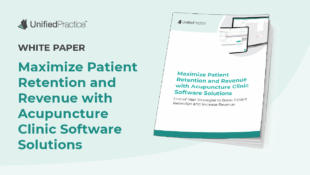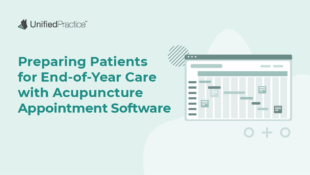“Do I have to?“
Any time we are facing change, this is a common and predictable question. As acupuncturists, many of us are small business owners; changing or implementing a new system can be a daunting task. Before doing something that has the potential to impact our business and patients, we evaluate whether or not that change is truly necessary or beneficial. Being prudent in choosing the correct course or change is an essential part of success.
Given the research and real-life experiences from practitioners, our team would (obviously) advise you to implement an acupuncture EHR software into your practice to streamline your practice, improve patient records, and deliver a higher quality of care. But you don’t only have to take our word! Before you take the plunge, it’s reasonable to ask: “Do I have to?” Even after learning all of the benefits to EHR use, this remains a common question.
Also see: Benefits of Electronic Health Records to Acupuncturists
Let’s explore what compels medical professionals to adopt EHR technology, especially when they may not want to. One of the major driving forces in wider adoption of EHR systems among physicians has been legislation. In 2009, HITECH (part of the economic stimulus legislation) provided funds for hospitals and clinics to switch from paper to electronic records. Any provider who participated in Medicare based programs could partake in these financial incentives.
In 2010, with the passing of the Affordable Care Act, mandates came into effect that made switching to electronic health records a requirement for full Medicare reimbursements. These two laws provided both the carrots and the sticks to encourage the switch from paper records to EHR, leading to a surge in digital adoption. According to a 2014 report by the CDC, EHR adaptation among office-based physicians reached 78 percent in 2013. As of 2018, more than 95 percent of hospitals and nearly 90 percent of office-based physicians have adopted an EHR. Compare that to just 18 percent in 2001, with no federal mandates or incentives.
When we talk about these laws, there is no national application to acupuncturists. Acupuncture is not currently a covered procedure in Medicare, Medicaid, or Tricare, so acupuncturists are under no federal incentive or obligation to switch to an EHR. So this brings us back to the question: “Do I have to?”

Universal Use of EHR
While there are no federal mandates affecting acupuncturists, there are states where universal use of EHR by all medical providers is required. These mandates were in effect at the beginning of 2015 in Minnesota and Massachusetts, and we can expect that more states will adopt universal EHR requirements in the next few years. In Minnesota, the health department has declared that acupuncturists are health practitioners and as a result are held to the mandate. Massachusetts has followed suit.
As of early 2015, only acupuncturists in these two states are legally required to implement EHR software into their practices. This can and will change over time. When acupuncture becomes a covered procedure by Medicare, Medicaid, and Tricare, acupuncturists can expect to be mandated to switch.
Moreover, the Accreditation Commission for Acupuncture and Oriental Medicine (ACAOM) currently requires curriculum to at least “teach” EHR in their school programs.
So, do you have to make the switch to an EHR? Depending on where you live, the answer might be no. But times are a’ changing and you can expect that with the successful implementation of EHRs, and the push to have acupuncture recognized as a legitimate treatment modality throughout our healthcare system, the answer to this question will be a resounding yes.
In part two of this discussion, we’ve explored some of the other pressing reasons to switch to an EHR, including the details surrounding insurance. You can read that HERE.
Guest blog post by Thomas Meade
Updated July 2019




